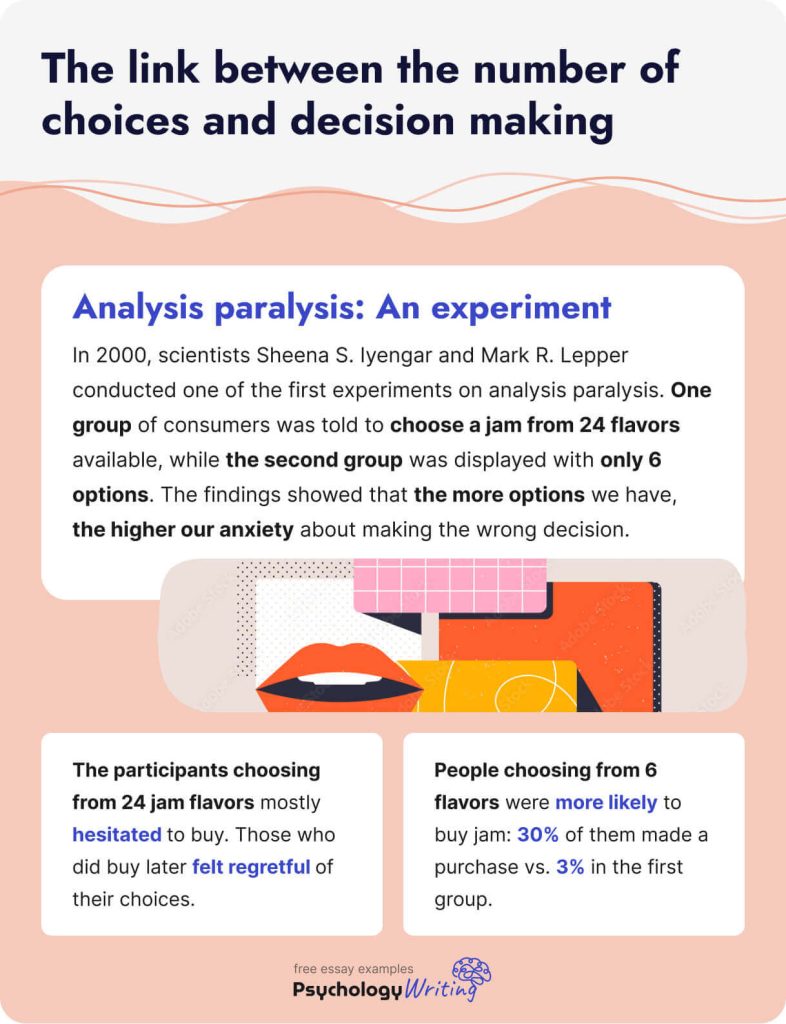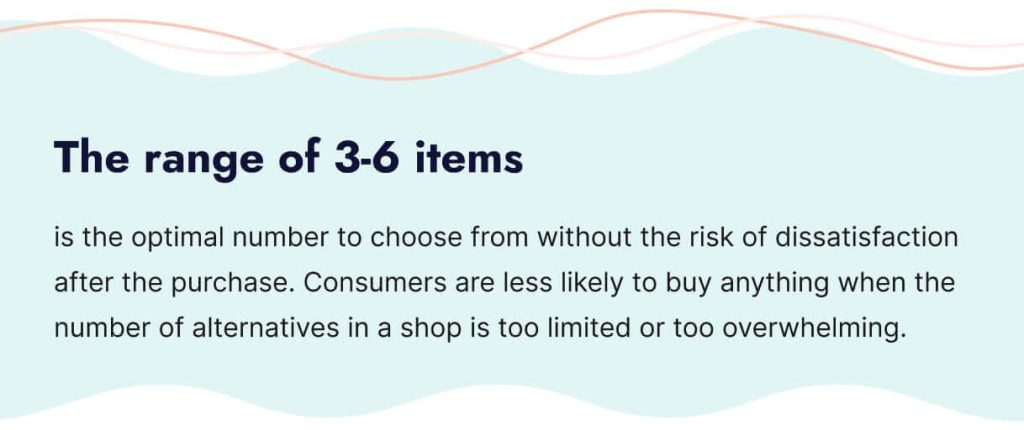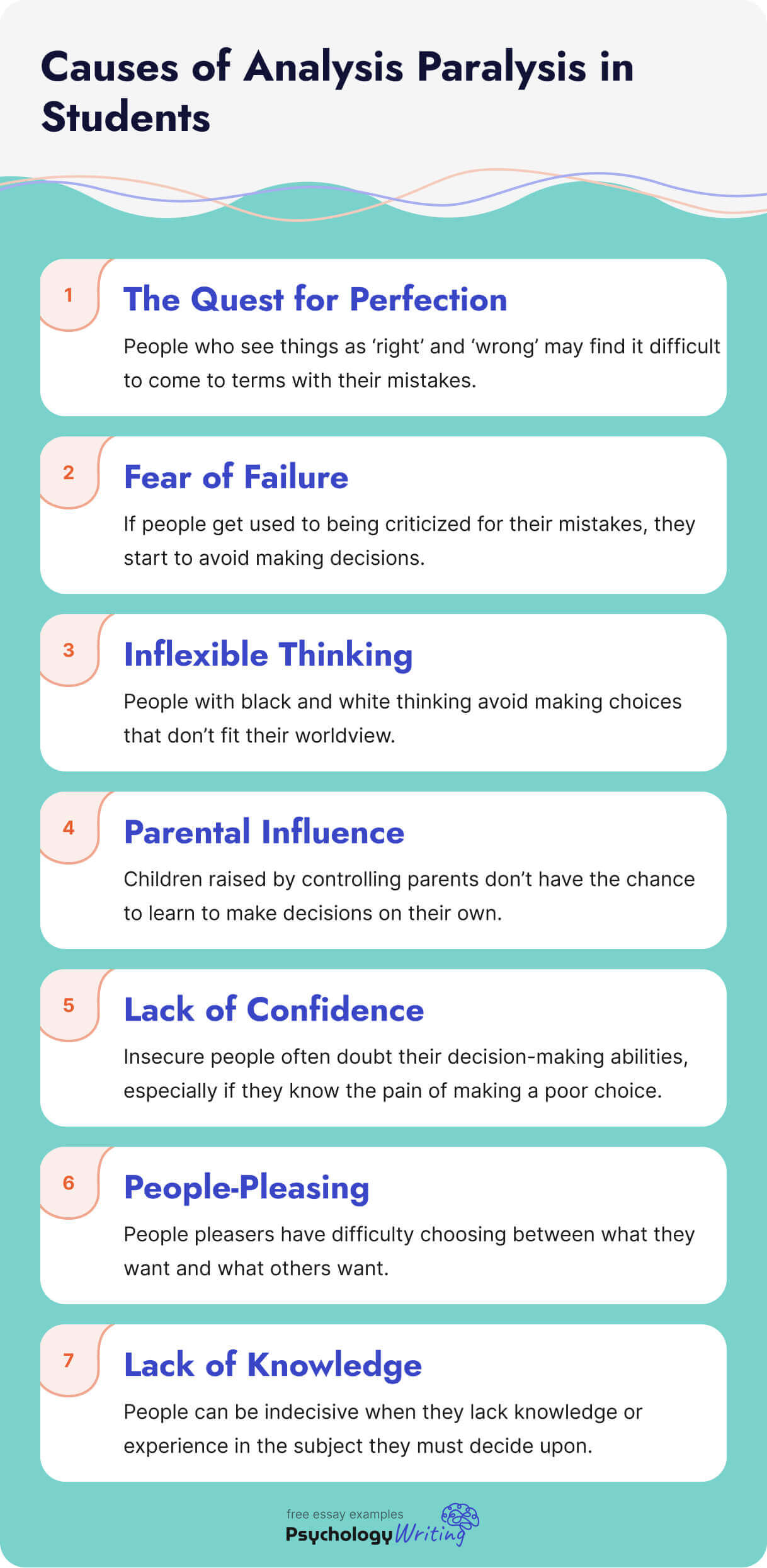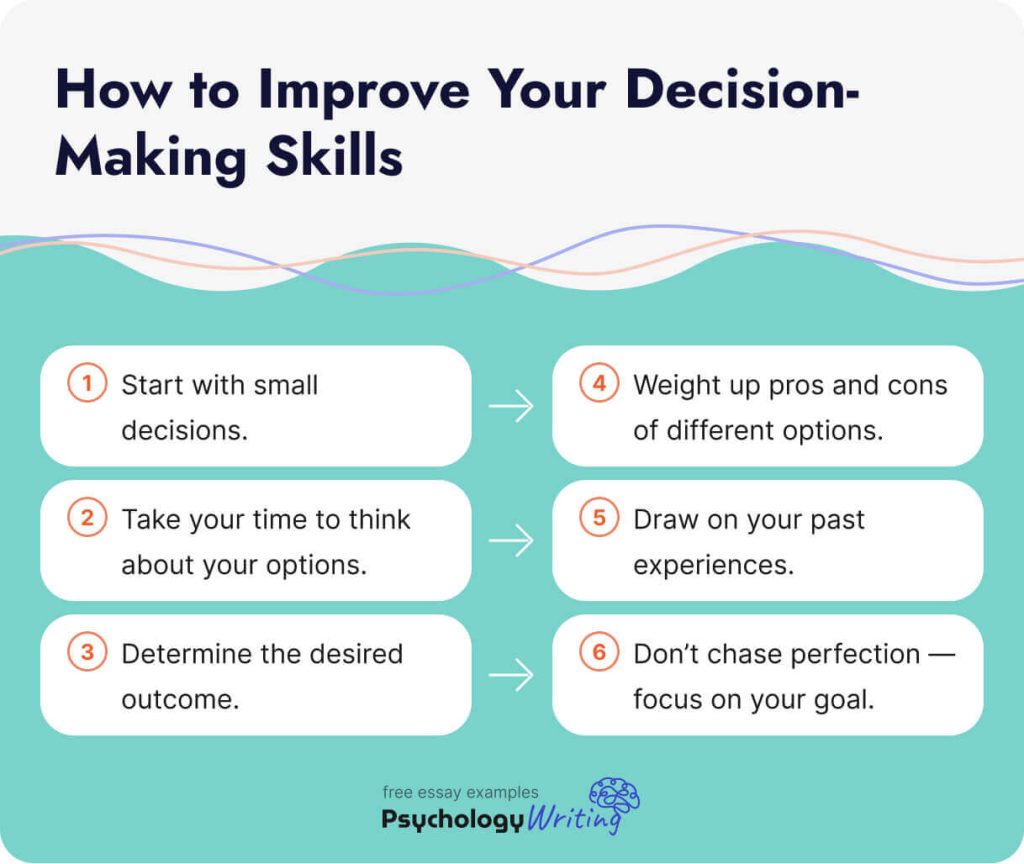Have you ever felt lost, wondering which outfit to wear, what college to choose, or what job offer to accept? The anxiety, indecision, and dissatisfaction you feel in these situations are caused by analysis paralysis. This is the widespread fear of making the wrong decision, which leads to overthinking, high stress, and a lack of productivity.
American psychologist Barry Schwartz coined the term ‘Paradox of Choice,’ which describes how increased choice allows us to achieve a better result but can also reduce our satisfaction. If you find yourself overwhelmed by a choice you need to make, you’re not alone. In this article, our experts cover the main causes of analysis paralysis and how you can overcome it.
🔤 What Is Analysis Paralysis?
The psychological phenomenon analysis paralysis is also called decision paralysis or choice paralysis. It is the inability to make a decision because of continuous overthinking. In other words, when a person has too many options to choose from, they end up endlessly wrangling over the pros and cons of each alternative.

Is Analysis Paralysis a Disorder?
No, analysis paralysis isn’t included in WHO’s international classification of diseases. However, certain psychological conditions can contribute to overthinking and an inability to choose.
ADHD
People with ADHD can have an especially tough time weighing up options. That’s because they typically have trouble with their brain’s executive function. Executive function is a set of cognitive processes responsible for our memory, flexible thinking, attention, and self-control. It acts as the ‘management center’ that impacts many areas of life, including decision-making.
Anxiety Disorder
For people with anxiety disorder, making difficult decisions can almost feel impossible. The Journal of Neuroscience published research that proves that being in a state of anxiety significantly affects how our prefrontal cortex operates. This is the part of our brain that is responsible for analyzing the advantages and disadvantages of a decision. Anxiety suppresses the activity of prefrontal cortex neurons, which are responsible for problem-solving, decision-making, and long-term planning.
Obsessive-Compulsive Disorder
People suffering from OCD can also find it challenging to make up their minds. Indecision in obsessive-compulsive disorder can be associated with the intensity of intrusive thoughts and high anxiety levels. Due to the nature of intrusive thoughts, people with OCD often fixate on finding every possible option for each situation before making a decision. This creates a cycle of worrying about all the consequences that may be at stake, which is hard to break.
Depression
Depression can feel suffocating and can manifest in the inability to make decisions. The common features of depressive disorder are sadness, emptiness, irritable mood, slowed thoughts, and difficulty concentrating. All of these cognitive changes significantly affect an individual’s capacity to function and make decisions.
Aboulomania
Aboulomania is another mental disorder in which a person suffers from weakened willpower or pathological indecisiveness. Some researchers believe that an authoritarian or overprotective parenting style causes the development of aboulomania. The symptoms of aboulomania include avoiding personal responsibility, becoming hurt easily by criticism, and feeling helpless when relationships end. All of this leads to difficulties making decisions without support from others.
If you find yourself in situations where your overthinking and indecisiveness become too much to handle, this might be a sign to seek professional help. In most cases, analysis paralysis is a natural reaction to a hard choice, but sometimes it can be a symptom of a more serious psychological disorder.
😕 Analysis Paralysis Examples
Some decisions are simple, and others leave us confused and overwhelmed. Usually, analysis paralysis occurs in areas like education, career, family or when the decision can greatly influence our future. In the next section, we will discuss what kinds of decisions are more likely to lead to choice paralysis.
1. Buying Decisions
Analysis paralysis can occur even when dealing with everyday buying decisions.
Recent research on the paradox of choice in online shopping revealed that around 66.8% of respondents get confused when faced with a lot of options on Amazon, Myntra, and Flipkart. Moreover, 56.9% of consumers feel dissatisfied after making a purchase online.
Another study compared the buying behavior of two groups of customers: one choosing pasta and the other picking a mobile phone. Both groups demonstrated the same trends. If the number of options is limited to 2 alternatives, customers refuse to buy immediately. With 3-6 options, it’s easy for the consumer to choose quickly without much thought. Consumers tend to postpone buying if more than 10 choices are available.

These two studies prove that even our daily buying decisions are heavily influenced by analysis paralysis.
2. Educational Choices
Students are expected to make a lot of important decisions. What colleges should I apply to? Which classes should I take? What organizations are the best match for me? The enormous possibilities offered by a college curriculum can result in analysis paralysis, a fear of making mistakes, and dissatisfaction with the results. Paradoxically, the more opportunities students have to do what they want, the less likely they are to do anything at all.
3. Job Search
Job search is another choice that might feel paralyzing, both when starting your first career after graduation or transitioning to another one. Searching for a job is a challenging task in and of itself, but analysis paralysis can make it even harder. You might struggle from choice paralysis during a job search if you:
- Overanalyze and put things off.
- Constantly revise your resume due to the fear it is not good enough.
- Extensively research but don’t do anything with the results.
- Give into negative self-talk and demotivate yourself.
The worst part is that overthinking and indecisiveness occupy the time you could have spent working on new skills and gaining new experiences.
🧩 What Causes Analysis Paralysis in Students?
Although anyone can experience analysis paralysis, certain factors contribute to this feeling.

The Quest for Perfection
Perfectionists are often very cautious people and see things as ‘right’ and ‘wrong,’ which in and of itself is not bad. However, perfectionism can lead to trouble when you deal with decisions regarding relationships, career, or future goals. Problems arise when perfectionists find themselves paralyzed at the thought of accidentally choosing the ‘wrong’ option. If a ‘mistake’ is made, they struggle to forgive themselves and continue overthinking about what they could have done differently.
Fear of Failure
People who grew up in environments where their parents heavily criticized their decisions tend to demonstrate the fear of being seen as a failure. If this fear carries over into adulthood, a person starts using indecisiveness as an unconscious coping strategy. In other words, when the human brain links stress and anxiety with decision-making, it avoids making small and large decisions.
Inflexible Thinking
Making decisions becomes much tougher when a person sees the world in binaries — right or wrong, white or black, good or bad. In reality, some decisions don’t fall into either category or can be a mix of both. When individuals with inflexible thinking face choices outside their usual black-and-white worldview, they cannot comprehend them. Consequently, they often end up distancing themselves from making any decision.
Parental Influence
Often the root of indecision goes back to parental influence. Children who grow up with overbearing parents don’t have an opportunity to make decisions independently. Eventually, they enter adult life not knowing how to make a choice and deal with consequences on their own. They risk over-relying on others to make important choices.
Lack of Confidence
A key component of decision-making is self-confidence. Insecure people tend to procrastinate before making a decision and then struggle with sticking to it. Usually, they seek the advice of others or spend an extraordinary amount of time weighing up the pros and cons. It’s hard to break the cycle of self-doubt, especially if a person knows the pain of making a poor choice.
People-Pleasing or Excessive Empathy
Empathy is essential for developing relationships, but it can cause challenges when making decisions that impact others. Individuals with excess empathy or people pleasers may feel overwhelmed trying not to hurt anybody’s feelings when making a choice. Unfortunately, at times it can cost them their own happiness. If you’re a people pleaser, you may also continuously struggle between choosing between what you want and what others want.
Lack of Knowledge
Indecisiveness might indicate that we lack knowledge or experience in the subject we must decide upon. Some people are confident enough to decide promptly, relying on their intuition. Others put aside decision-making until they feel they have enough information, which often takes a lot of time and effort.
🤔 How Overthinking Can Affect Your Life
Analysis paralysis involves fixating on the same thoughts over and over. Unfortunately, delaying actions while over-analyzing information doesn’t help when you need to get things done. There are several ways in which overthinking can hold you back.
🦸🏽 How to Overcome Analysis Paralysis
Now that we know analysis paralysis can seriously harm productivity, what can we do about it? Here are key strategies to end analysis paralysis and ultimately do more with less stress.
Prioritize Your Decisions
Not all decisions are created equal. For example, choosing what classes to take next semester has a greater impact on your life than deciding what to make for breakfast. Our ability to make long-term decisions weakens with each additional choice we make, even the smallest ones. Try to tackle the most crucial decision first and make small decisions as automatically as possible or delegate them.
Set a Deadline
The key to making decisions more efficiently is to have a deadline. However, we don’t always have a time constraint posed by a professor or a boss. In such cases, you should set a deadline for yourself. Of course, it’s difficult to trick yourself into thinking such deadlines are real. To hold yourself accountable, make your deadline as public as possible. You can share it with friends or family or make a social media post.
Start Before You Feel Ready
One of the best solutions for overcoming analysis paralysis is to start before you feel ready. Procrastination tricks us into feeling uncertain or unprepared. In reality, what you have right now is enough to start. In other words, collecting and analyzing information is only an illusion that we are making progress. The next time you’re stuck in an overthinking spiral, remember that successful people start before they feel ready.
Limit The Amount of Information
When making a choice, it’s important to approach your research with intention. One of the secrets to productivity is to efficiently manage information and get through it without getting overwhelmed. Don’t try to discuss your choice with every person you know or read all the articles you can find on your topic. It’s better to determine the number of resources you’ll use beforehand and keep your focus strictly on those.
Ask for Advice
The next time you find yourself overthinking a particular issue, schedule a meeting with a professor, mentor, or friend. Studies have shown that other people, even complete strangers, are often better at predicting our satisfaction with a particular decision. As you describe your dilemma, you synthesize the information clearly and concisely. Having someone’s support can be what you need to overcome self-doubt.
Adopt an Iterative Mindset
We often base our decisions on assumptions that may or may not be accurate. However, the only way to test whether your choice is correct is to actually take action. Luckily, there’s an easy way to test our assumptions called an iterative approach. The basic idea behind the iterative approach is to perceive each decision as an experiment. This mindset gives us the freedom to choose something faster because we know we can improve upon it later or pivot as necessary.
Respect Your Decisions
There is a common misconception that the best decision exists, we just need to figure it out by thinking harder. The reality is that many options might be equally valid. What makes our decisions feel ‘right’ is our confidence and commitment to them. So next time, instead of overanalyzing a problem, pick an option and you’ll be more motivated to succeed and create an actionable plan.
📌 Improving Decision-Making Skills: Tips for Students
The good news is that decision-making is a skill you can master. If you find yourself procrastinating or overanalyzing your decisions, there are a few hacks you will find helpful.

- Start with small decisions.
We advise breaking big decisions down into smaller and more manageable steps. You might want to create an action plan to take you through every stage and help track your progress. Thinking of a big choice as a series of smaller ones removes anxiety and builds confidence. - Take your time.
Most problems don’t require you to make impulsive or emotionally charged decisions. Emergencies sometimes pop up, but most college-related issues allow you time to gather information and weigh your options. The more you practice mindful decision-making, the fewer mistakes you will likely make. If you’re feeling pressure from someone to make a decision, don’t hesitate to say, “I need more time to think about it, and I’ll get back to you with an answer.” - Determine the desired outcome.
Before weighing up the pros and cons of your options, think of a successful outcome. A detailed picture of your desired results will offer clarity and reduce anxiety. One of the best techniques to determine a desired outcome is visualizing. You can either build a mental image or make a dream board with printed pictures. - Weight up pros and cons.
To enable you to make smart choices, you should try making pros and cons lists. Basically, you need to review each option and imagine how it’ll contribute to a desired outcome. Don’t focus solely on the negative aspects or the positive. Your goal should be to come up with an objective analysis that will help narrow your options. - Draw on past experiences.
Embrace past experiences to improve your decision-making skills, even if in the past you failed. Everyone makes mistakes, and learning from them helps us make better choices in the future. Set aside time to reflect on decisions you made in the past and think about what you could have done differently. - Don’t chase perfection.
We’ve all heard that “done is better than perfect.” This statement is especially true for decision-making. Instead of focusing on perfection, ask yourself which option will get you closer to your goal. When you stop thinking of decisions as life or death, you learn to avoid the pursuit of perfection. Remember that your decisions are just learning experiences.
🏁 Conclusion
It’s entirely natural to experience analysis paralysis, especially when you’re about to make an important decision. However, when overthinking gets out of control, it can seriously harm your academic performance, relationships with others, and your mental wellbeing.
If you find yourself paralyzed by your daily choices, it’s a sign that you need to work on your decisiveness. Learn to prioritize your decisions, set deadlines, visualize the perfect outcome, and don’t hesitate to ask for advice. Remember that smart decision-making is like a muscle you can train to reduce procrastination and the stress caused by choice paralysis.
🔗 References
- The Paradox of Choice: Too Many Flavors at the Ice Cream Store | Massachusetts Institute of Technology
- What Is Analysis Paralysis? | Verywell Mind
- The Paralysis of Depression in the Workplace | SHRM
- OCD and Indecision: Why Making Up Your Mind May Be So Difficult | PsychCentral
- What Is Analysis Paralysis? (Plus 8 Tips To Overcome It) | Indeed
- Why Am I So Indecisive? 10 Methods That Can Help You Make Decisions | PsychCentral
- Steps to Improve Your Decision-Making Skills | Monster
- How to Be More Decisive | Tony Robbins
- Avoiding Analysis Paralysis in Your Job Hunt | University of Washington
- Understanding and Overcoming Procrastination | Princeton University

